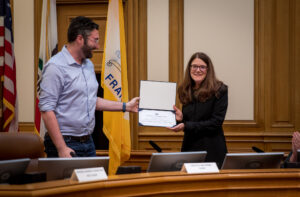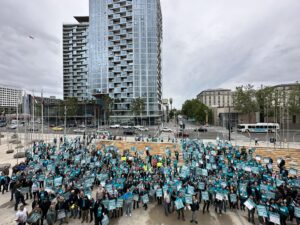
Imagine being an IT worker who hauls heavy tech equipment and crawls under dusty desks to fix computers, and getting a memorandum from your office that you are now required to start wearing dress slacks and professional business attire while doing your job.
That’s what happened to the civilian employees at SFPD a few months ago. A “Dress and Grooming Standards” memo was sent to civilian staff requiring that men must be clean shaven with short, neat hair, women could only wear minimal jewelry and have “conservative” manicures or make up, and all civilian employees would be required to wear business attire (jeans or t-shirts would not be allowed) while on the job.
The new uniform policy imposed an unreasonable ask upon civilian workers. For example, Executive Secretaries at the SFPD always dress professionally for work. But having a manicure and wearing some make up doesn’t affect their work, so the policy would be an unreasonable burden.
IT workers at SFPD are often crawling under desks to check cords, working in dusty server rooms, and lugging around heavy computer equipment. They usually wear khakis and work boots. Under the new uniform policy, they would be required to wear button ups and suit pants, which wouldn’t make sense for the work that they do. SFPD IT workers also almost never interact with the public, and many of the male IT workers have ponytails and beards. On top of functionality concerns, to require IT workers to be “neat and presentable” would mean they would have to buy new clothes at their own expense, making it an unreasonable burden.
The SFPD has a history of disregarding the differences between sworn officers and civilian employees. Sworn officers and civilian staff have very different duties, and their jobs have different requirements. But that hasn’t prevented the Department from trying to impose sworn officer policies onto civilian employees, even when it makes little to no sense.
In another example, the Department has sworn officers regularly work as supervisors of the SFPD civilian workface. If an officer is injured on duty or if they are being investigated for misconduct, they may be placed on desk duty. The Department assigns them to temporarily supervise civilian workers, like those in the IT department, even if they have limited knowledge or IT expertise. It also has uniformed officers performing civilian personnel duties, like going out to get ink toner. This is not the best use of the sworn officer’s skills, and work that should instead be assigned to a civilian employee. SFPD has a penchant for ignoring civilian union contracts, and Local 21 members must stay vigilant to protect our rights.
“The issue at hand is respect,” said Local 21 member Steve Senatori. “If SFPD doesn’t have respect for civilian employees who help the officers do their jobs, it makes it harder for all of us. We civilian employees have respect for the officers who have dangerous jobs; we’re concerned for their safety, and we do our best do make their jobs easier, especially when it comes to administrative and tech job duties. But it needs to be a two-way street; the Department also needs to respect the civilian employees, follow the contract, and understand that we are different from sworn officers.”
After SFPD distributed the civilian employee uniform policy, several Local 21 members took action. The members were understandably upset; it felt like an invasion of personal rights be required to dress and look a certain way that would either have nothing to do with, or worse hinder, their work.
Local 21 contacted the Human Resources (HR) Director and requested to meet and confer on the new policy to discuss the impacts it would have on members. No other City department has such a strict dress code for civilian staff. We argued that the basic standards set in the SF employee handbook are enough; why would they need to be made more restrictive in this department?
Swiftly thereafter, HR sent out a cancellation of the policy, and no one got disciplined for not following the memo.
In investigating the issue, HR concluded that the proper chain of command and procedures were not followed in releasing the directive, so it was effectively rescinded. Local 21 members are now free to dress comfortably and appropriately for work as they see fit.
The MMBA (Meyers-Milias-Brown Act) allows unions to meet and confer with employers over the impact of new policies that will substantially change employees’ working conditions. Please reach out to your Local 21 leaders if you feel a new Department policy would adversely affect your work. We’re fortunate to have strong leaders at SFPD who knew their rights and acted to resolve the issue before anyone got disciplined. With the upcoming Janus vs. AFSCME Supreme Court decision potentially dealing a crippling blow to labor unions, we need to know our rights and get involved with our union now more than ever. Our union is only as strong as our membership!
A special thank you to Local 21 Representative/ Organizer Emma Erbach and Local 21 member Steve Senatori for their contributions towards beating back this policy.





